
We continue now into part two of our three-part series on the 2020 Collapse of Small Business. Buckle up, we are tackling mental health, lockdowns, and re-injury. This series wasn't easy to write or share, but it feels so necessary. We must all understand the reality of this situation to immediately put a stop to it. And more importantly, to never allow it to happen again in our great nation.
This is the second in a three-part series (catch-up on the first one here if you missed it). Sign-up to receive each new entrepreneurial-themed blog post delivered conveniently to your inbox when they arrive!
DISCLAIMER: This is a real-life example of one family-owned small-business in the service sector in Oregon, USA. The details shared here are to help educate the public and provide an inside look to those who may be far removed from these realities.
The Mental Health Impact
We left off in the part 1 blog with the reality of the financial impacts that 'non-essential' small businesses like ours were facing in 2020, the actual figures. Think of how you might feel if you lost your business that had been your passion for 8-10 years. What emotions might you experience as you watched your finances slip away?
As a bodyworker, how would you feel getting desperate texts and emails from your clients asking when they can see you, and knowing that it was illegal in your state for you to practice your licensed profession to be able to help them?
Confusion. Depression. A feeling of an absolute and complete loss; many of the phases of grief including denial and anger.
Mental health is a cause that we speak out on often. This is also something that has been a large focus of James' business and he has put countless hours into advocating for himself and others. From personal interviews with OSU graduate students studying PTSD, to forming community support groups under The Archangel Programs (T.A.Ps) where James built a rucking crew with over 90 members to support fitness and build community while battling mental health stigmas and supporting people, James and I will never stop speaking out to bring awareness and healing. (If you don't know about rucking I've blogged about Rucking Fitness Adventures before).
How did we as a society come to this place of inflicting this abuse onto select business owners in our free nation?
How can we define who is essential?
Don't Jump.
I was so taken by how Mike Rowe described his December 17th interview on Hannity, I had to just point to him and that post on his Facebook page. Jump over there to read it and then hurry back, we have more to talk through! I can only echo Mike's message of encouragement to all of the others in our same position:
"To those millions of Americans who have lost your livelihoods, now teetering on the edge your own metaphorical bridge, wondering if perhaps you’re worth more dead than alive, I say this:
You still matter. You are still essential to someone, even if only to yourself. Why? Because you are still a part of a great tapestry - a single tile in a mighty mosaic that connects us all. And, because you are still loved. Which is a long way of saying, don’t jump."
What if it is too late for them?
Deaths of Despair
I believe how businesses and other non-essential citizens have been treated is a significant contributor to the ‘deaths of despair’ that I wrote about in the Not My New Normal blog.
Did you know that throughout most of 2020, there were as many suicides in Oregon as COVID deaths? But I guess those lives didn’t matter since they don’t flood our local news headlines. And I guess our concern wasn't actually the health of Oregonians or Americans, only those dying of this popular new headline cause.
The final point I will make on mental health here is to please do not cast your beliefs on those who are struggling. I say that speaking from an experience of one of our long term clients. She emailed us in response to our notice of our business closure to blame us that our 'taking too much time off' and 'not working our business '24/7/365' as the cause of our downfall. Not COVID, not government shutdowns and tyranny against small businesses (remember, big businesses were always essential), but her impression of our business management. How sad, how naive, and how hurtful.
But weren't the lockdowns in states like Oregon justified by their data?
So much for following 'the science'
I will let the headlines and data speak for themselves in late January 2021: OREGON HAS 4TH FEWEST VIRUS CASES, YET AMONG STRICTEST LOCKDOWNS
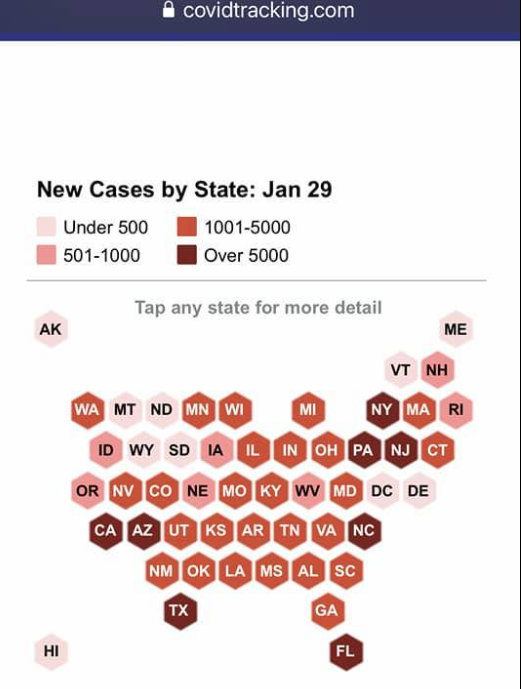 | 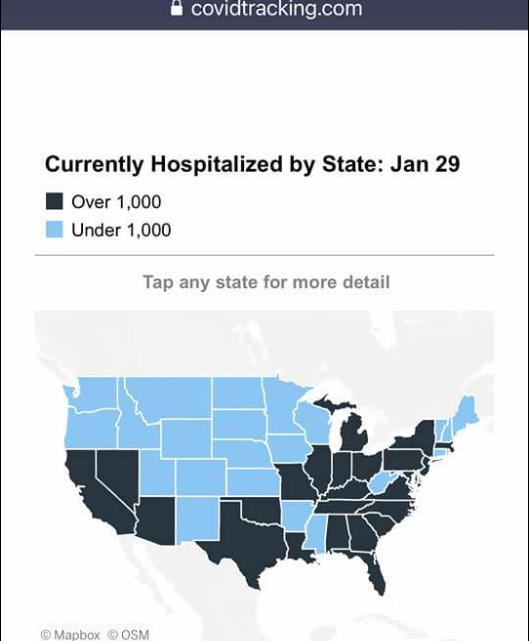 | 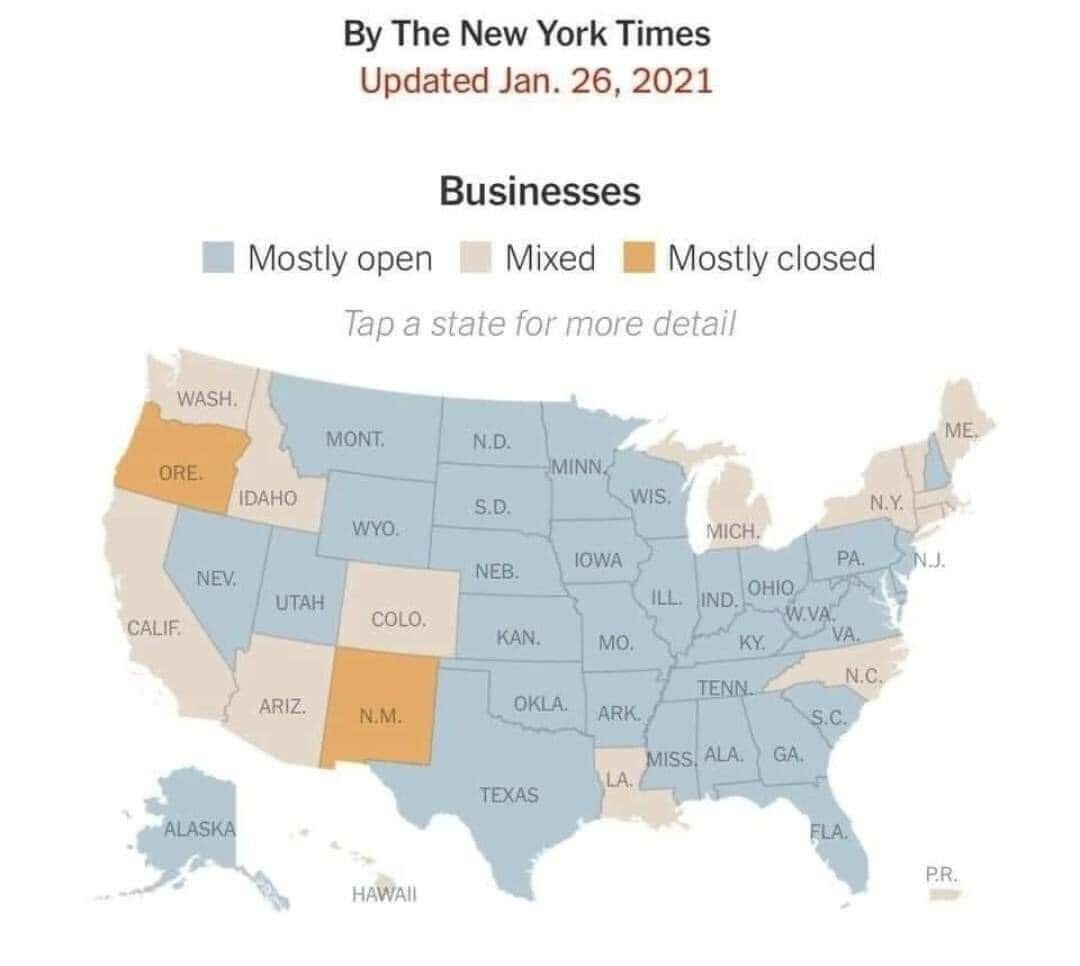 |
Don't be misled that the low case numbers there are thanks to the lockdowns. States that never implemented lockdowns have lower cases than Oregon. Looking at actual numbers is always eye-opening.
- California and New York were among the strictest on state mandates yet still had spikes months into their lockdowns and mandates and still have more cases than the other states.
- South Dakota had one major spike and then a major drop in cases and no major lockdowns or mandates.
We must be honest about the full impact here, on our children, our businesses and economies, and beyond.
Re-injuring Oregon
As I write this blog, we have already fled our home state of Oregon where we are still making good on our long-term lease paying rent to a landlord in a state we no longer live or do business in until that space can be rented to another tenant. #BeAPersonOfYourWord
Surely now that many businesses on the EO 20-12 have been allowed to re-opened to 100% capacity, these are all things of the past right?!? No. They continue to be threatened, locked down, heavily restricted, and wholly unsupported by their state leaders.
Our business never got above 20% capacity after the initial shut down. From March until December each time there was a new shut down in any sector (even if we weren’t impacted) our clients still reacted and our volumes fell further and further to 15% and 12% of what we started. So no, just “re-opening” all business 100% won’t immediately resolve all issues, though it will be a good starting point and must be done ASAP.
How many citizens like me lost ‘disposable’ income to take advantage of services like haircuts or self-care in the form of things like acupuncture or massage?
I did. I've shared our business impact for my husband James, but my personal example has come from work as a contracted consultant in the healthcare IT industry for six and a half years. In that time, I have not been without a contract for longer than two weeks on average. In 2020, I ended a contract as anticipated on 7/31/20 and was without work for almost 27 weeks. So as the primary breadwinner, the reality became for us that I was forced to apply for unemployment for the first time in my life (and I have worked since I was 14 years old).


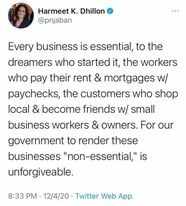
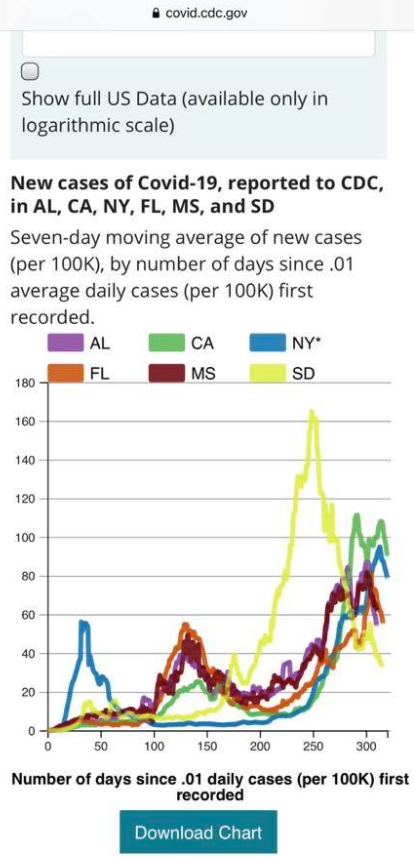















0 Comments